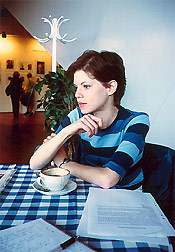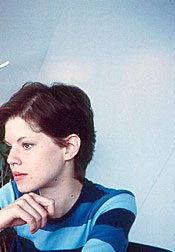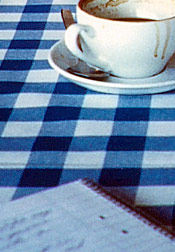


part 1 | part 2
Johanna Nilsson is looking out through the big windows of Teaterbaren picturing Sergel’s square as she generously shares of her future plans.
“I want to write a novel about this girl named Ela," she says taking a zip of her coffee. "I don’t know much more about her except that her characteristics are pretty wild.” And she continues telling us about how she first found her inspiration for the name Ela, how she makes up characters of people she knows, people she meet and how she takes inspiration for her books from her own life.
Seventeen years old Johanna got a computer from her father. It was old but it didn’t matter, it made it easier to write and edit longer texts and Johanna began writing her first fiction. Earlier she had been writing mostly articles for different magazines thinking she’ll be a journalist, but now, with the computer, things had changed and Johanna began writing longer texts. She never thought twice about submitting her short stories to competitions and the results were often positive. She won prices. Once she even got a trip to Bonn.
So far she mostly wrote short story fiction, but one day she got curious of how far she could really write. So she decided to try quantity instead of quality, as she puts it.
“I wrote this long story on about 32 pages and at that time it was enormously huge for me,” she laughs.
She remembers always getting up in the mornings so that she could write a couple of pages just before school.
“I feel ‘rich’ when I write,” she explains. “It’s like I’m having a universe inside of me. For me all those people in my books really exist. They are real to me.” And she looks at us, maybe wondering if we understand.
She has written all of her books in a very fast paste. The first novel took her six weeks to finish, the second four.
“This one took me three months to finish,” Johanna says, almost a bit astound, pointing at the manuscript of her latest novel. But she seems to be forgetting that she also managed writing a children’s book somewhere in between.
At the same time Johanna seems to need the chance to put her focus on other things now and then. She has been studying at the university parallel with her writing since –92, when she graduated high-school and even though she makes her living as a writer today she’s never happy with strictly writing.
“I wish that I had lived during the renaissance when you could be an expert in every field,” she says jokingly. It sounds like she wants to study everything and do even more. Her only problem is probably that there’s not enough time. Johanna also wants to act in movies and write song lyrics and screenplays she tells us.
“I’ve been contacted by a movie director who wants to shoot a movie out of my first novel, Hon går genom tavlan ut ur bilden (roughly translated: She goes trough the picture out of the frame). Somebody else will transform the novel into a screenplay, but I would also like to do it myself in the future. All the steps from screenplay to producing the actual movie itself.” She has already got plans on rewriting her third and latest novel into a screenplay.
“I just don’t know how to write a screenplay yet,” Johanna says. “I’ve never seen one.”
Robin wonders if it requires that you master the language well to become a writer, but Johanna thinks that’s not of the primarily importance. It’s more about having your own style, she thinks, and she tells us about how frustrated she used to be when her publisher would return her aspiring work with the comment “You write very well and you should keep on writing, but you need to find you tone...”.
“I could never understand what she meant by ‘you need to find your tone’,” Johanna says. I ask her if she understands what it means today.
She thinks for a second. “Yes, I do.”
part 1 | part 2